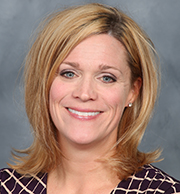
From the Chair: Removing Barriers for LGBTQ+ Students
By Jennifer Kirk | November 2022
 In June 2021, the U.S. Department of Education released a fact sheet on supporting transgender youth in school. This document offers references to Title IX, the Office of Civil Rights and examples of policies and practice to support LGBTQ+ students in school. This supportive resource, and others like it, comes as LGBTQ+ students continue to “experience bullying, harassment, and other discrimination because of their sexual orientation or gender identity.” The 2022 National Survey on LGBTQ Youth Mental Health shares a plethora of statistics and information on the state of affairs of LGBTQ youth in the U.S. Concerning numbers include:
In June 2021, the U.S. Department of Education released a fact sheet on supporting transgender youth in school. This document offers references to Title IX, the Office of Civil Rights and examples of policies and practice to support LGBTQ+ students in school. This supportive resource, and others like it, comes as LGBTQ+ students continue to “experience bullying, harassment, and other discrimination because of their sexual orientation or gender identity.” The 2022 National Survey on LGBTQ Youth Mental Health shares a plethora of statistics and information on the state of affairs of LGBTQ youth in the U.S. Concerning numbers include:
- 36 percent of LGBTQ youth reported that they have been physically threatened or harmed due to either their sexual orientation or gender identity.
- 45 percent of LGBTQ youth seriously considered suicide in the past year (four times more likely than their peers).
- Fewer than 1 in 3 transgender and nonbinary youth found their home to be gender affirming.
- 73 percent of LGBTQ youth reported that they had experienced discrimination based on their sexual orientation or gender identity at least once in their lifetime.
The Pennsylvania School Counselors Association represents school counselors, counselor educators and graduate students and works toward implementing comprehensive programming to ensure equitable educational outcomes for all students. These outcomes include academic success, college and career readiness and social/emotional wellness and development.
- School counselors have an ethical responsibility to honor and respect all students’ right to be treated equitably and fairly, regardless of their race, gender identity, gender expression, sexual orientation, language and/or ability status. PSCA advocates for the academic success of all students for the best possible outcomes.
- According to ASCA’s position statement on transgender and nonbinary youth, “school counselors work to safeguard the well-being of transgender and nonbinary youth. School counselors recognize all students have the right to be treated equally and fairly, with dignity and respect as unique individuals, free from discrimination, harassment and bullying based on their gender identity and gender expression.” GLSEN research shows that transgender students experience success when they have a trusted and caring adult at school. Often, this trusted and caring adult is the school counselor.
- Transgender and nonbinary students have a FERPA-protected right to privacy; this extends to students’ gender identity, birth name, sex assigned at birth and medical history. FERPA is the Family Educational Rights and Privacy Act that gives protection to students and parents regarding education records that are maintained by schools.
- School counselors strive to collaborate with families and all educational partners to promote success for all students while protecting their confidentiality. Disclosure of gender identity is directed by students’ comfort about what and with whom to share their confidential information.
- PSCA commits to ongoing practices to build equity across Pennsylvania; this includes recognizing when systemic barriers exist and working to remove barriers for transgender and nonbinary students, and for all marginalized students.
Contact Jennifer Kirk, PSCA board chair, at jkirk@uscsd.k12.pa.us.